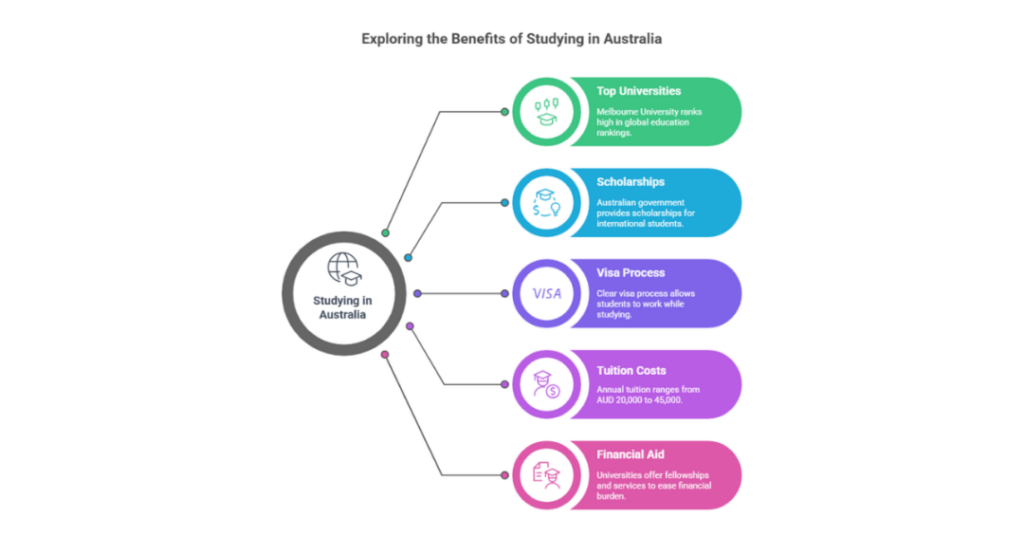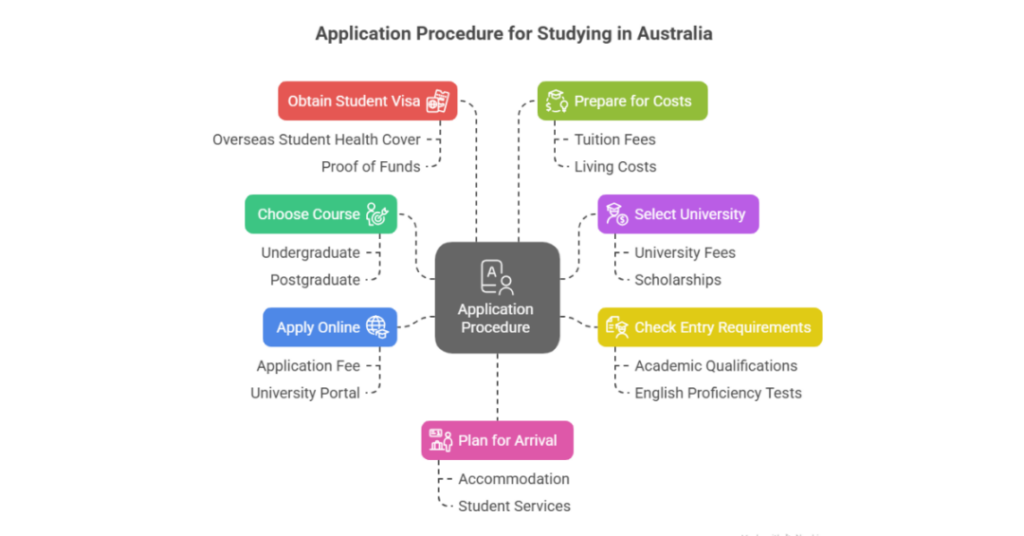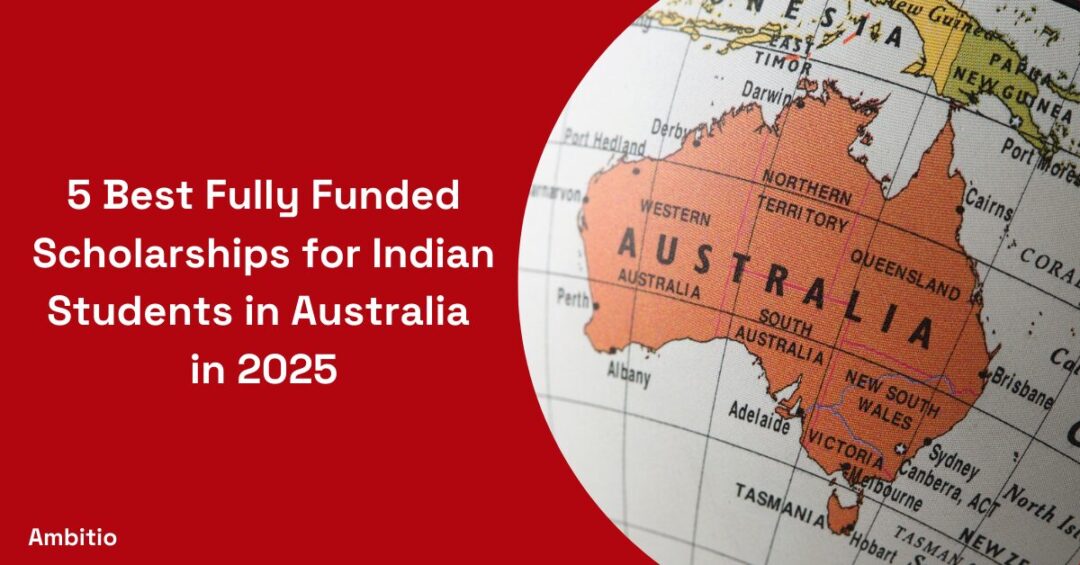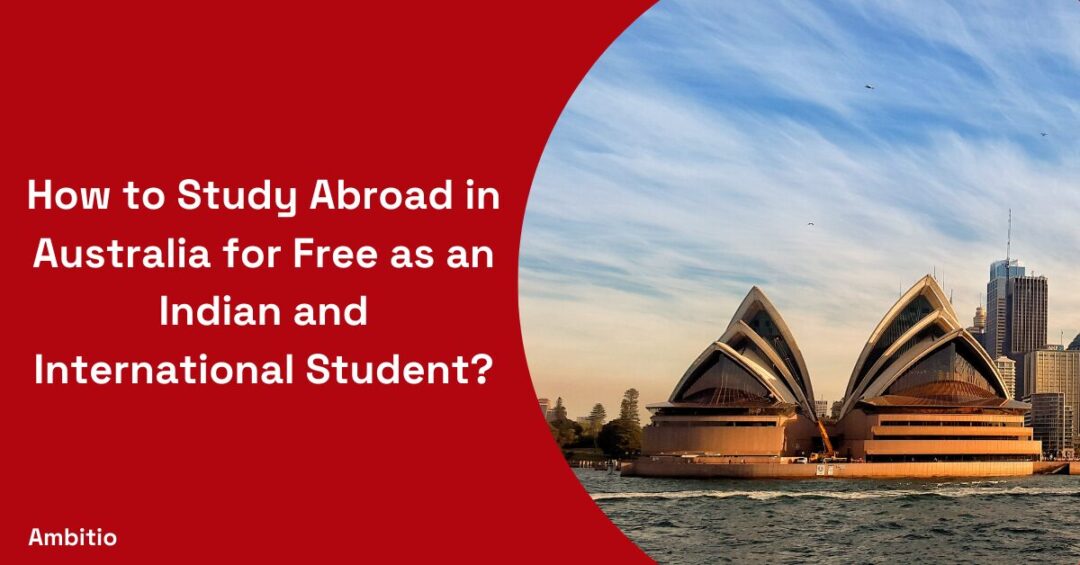22 May 2025
7 minutes read
Australia University Fees for Indian Students: What You Need to Know

Key Takeaways
- Australia university fees range from AUD 20,000 to 50,000 annually, depending on the program and institution.
- Scholarships like Australia Awards can help reduce study costs for international students.
- Budgeting for living costs and selecting affordable universities is essential for managing expenses while studying in Australia.
Did you know that the average tuition fee for international students in Australia can range between AUD 20,000 to 45,000 annually? For Indian students planning to study in Australia, this could be a significant financial hurdle.
With rising living costs and tuition fees in Australia, many students find it difficult to manage the cost of studying in Australia. But don’t worry, there are scholarships and ways to reduce the cost of study and living expenses through careful planning and research.
Why Study in Australia?
Australia is quickly becoming one of the most sought-after study destinations for Indian students. But with a range of costs to study in Australia, it’s essential to understand what you’re getting into before applying.

Here’s why studying abroad in Australia is a great choice:
- Top universities like Melbourne offer world-class higher education and consistently rank high in QS World University rankings.
- The Australian government offers various scholarships to study, making it more affordable for international students.
- Australia’s student visa process is clear and straightforward, allowing students to stay and work while studying.
- Cost to study in Australia can vary, but annual tuition fees range from AUD 20,000 to 45,000, with additional living costs in Australia calculated per year.
- Australia university fees may seem expensive, but universities offer financial aid like fellowships funded by the Australian government and student services to ease the burden.
Application procedure to study in Australia for Indian students as well as overseas Students
Studying in Australia is a dream for many Indian students and overseas students alike, but the application process can be complex. Before you start, it’s essential to understand the costs for international students, including Australia university fees, living costs in Australia, and other related expenses.

The entire process involves multiple steps that ensure a smooth transition to studying in this beautiful country. Here’s a breakdown of the application procedure:
Choose the right course in Australia
Courses in Australia vary greatly depending on your level of study—whether you’re an undergraduate student or a postgraduate student. Ensure that the program aligns with your career goals.
Select a university
Research universities in Australia that offer the program you’re interested in. The cost in Australia for international students varies, so make sure to consider Australia university fees and potential scholarships to study. Many universities provide opportunities for student services and amenities fee.
Check entry requirements
Make sure you meet the education in Australia requirements, such as academic qualifications, English proficiency tests (like IELTS/TOEFL), and more.
Apply online
Submit your application through the university portal or via study abroad aspirants programs. Some universities require an application fee, so be sure to check each university’s individual fees.
Obtain an Australian student visa
Once accepted, apply for an Australia student visa or Australian student visa. Ensure you have all required documents, including overseas student health insurance and proof of funds for expenses in Australia.
Prepare for the costs
Along with the tuition fees and living cost in Australia, you must consider additional expenses such as overseas student health coverage and the cost of veterinary and medical degrees if you’re studying in those fields.
Plan for your arrival
Once your visa is granted, make arrangements for your work in Australia, accommodations, and other student visa in Australia requirements like student services.
By following this step-by-step guide, Indian students and overseas students can ensure they’re prepared for the cost of studying in Australia and have everything in place for a successful study experience.
Tuition Fees at Top Australian Universities for Indian Students
The cost to study in Australia can be high, but Australia is still one of the most sought-after destinations for students looking to study abroad.
With Australia university fees varying by course and university, it’s crucial to consider the average cost when planning your budget. Here’s a breakdown of tuition fees at some of the top universities in Australia:
| University | Course | Average Annual Tuition Fees (AUD) |
|---|---|---|
| University of Melbourne | Engineering, Business, Law | 30,000 – 45,000 |
| Australian National University | Computer Science, Arts, Social Sciences | 28,000 – 40,000 |
| University of Sydney | Medicine, Engineering, Arts | 35,000 – 50,000 |
| University of Queensland | Business, Engineering, Life Sciences | 32,000 – 45,000 |
| University of New South Wales | Law, Arts, Engineering | 30,000 – 40,000 |
Australia university fees can be high, but many universities charge differently depending on the level of study and the course. Always consider the cost to study in Australia, including the study visa and living costs in Australia, when applying to universities. While Australia may seem expensive, there are many scholarships to study that can ease the burden.
Cost of Living in Australia for Indian Students
Australia is a top destination for international students, but living in this vibrant country can be expensive in Australia. The cost of living varies based on location and lifestyle, so it’s crucial to plan ahead.
Here’s a breakdown of the cost of living in Australia for Indian students, covering daily expenses, rent, food, transportation, and other essential costs:
| Expense Type | Average Cost (AUD) | Notes |
|---|---|---|
| Rent | 1,000 – 2,000/month | Rent varies greatly based on location; cities like Melbourne and Sydney are more expensive. |
| Food | 300 – 500/month | Home-cooked meals are cheaper, while dining out increases living costs in Australia. |
| Transportation | 100 – 150/month | Public transportation is affordable, but car rentals and taxis can be costly. |
| Utilities | 150 – 250/month | Electricity, water, and internet are usually additional costs not included in rent. |
| Miscellaneous Costs | 100 – 200/month | Includes entertainment, study materials, and student services fees. |
Financial Aid and Scholarships for Indian Students in Australia
While Australia can be expensive, there are numerous scholarships and financial aid options available for Indian students to help reduce the overall cost to study in Australia.
Many universities offer Australia awards and financial support to make studying in the country more accessible. Here’s a breakdown of some of the top scholarships available for international students:
| Scholarship Name | University/Organization | Eligibility | Coverage |
|---|---|---|---|
| Australia Awards Scholarships | Australian Government | Open to all international students | Full tuition fees, living allowance, travel expenses |
| Endeavour Scholarships | Australian Government | For postgraduate students | Full tuition fees, travel expenses, health cover |
| University-Specific Scholarships | Universities in Australia (e.g., University of Melbourne, UNSW) | Varies by program | Partial to full tuition fees based on merit and need |
| Research Training Program (RTP) | Australian Government | For research students | Covers tuition fees and living costs |
| Regional Scholarships | South Australia, Public Universities | Open to students applying for South Australia | Full or partial tuition fees, living allowance |
Australia university fees can be high, especially for veterinary and medical degrees, but scholarships to study can significantly reduce these costs for international students.
Be sure to explore financial aid options available at the universities you are interested in applying to, as Australia depends on offering diverse funding opportunities for both domestic and international students.
Study costs often include tuition fees and living costs, which are generally calculated per unit, so securing a scholarship is key for students looking to study in Australia.
Tips for Managing and Reducing Australia University Fees
Australia is one of the most popular study destinations for international students, but Australia university fees can be quite high, especially for certain programs like veterinary and medical degrees.
Understanding how to manage and reduce these costs is essential to making your education more affordable. Here are some practical tips to help you navigate Australia’s cost of study:
Choose affordable universities
Some universities in Australia offer competitive programs at a lower study in Australia cost compared to others. Research universities in the world to find those that align with your budget.
Apply for scholarships and financial aid
Many universities charge different fees depending on the program. Australia awards and scholarships for International students can help reduce tuition fees for both undergraduate and postgraduate students.
Consider public universities
Public universities often offer lower Australian tuition compared to private institutions. Look for universities that provide excellent quality education at a reasonable cost of overseas.
Plan your living costs
Living costs in Australia can add up, and students will be studying in a country where the year for living costs alone can be significant. Budget wisely for food, transportation, and accommodation to save money.
Work part-time
As an international student, you can work part-time to cover your expenses. This can help reduce your overall cost of studying in Australia while gaining valuable experience.
Look for cost-effective courses
While veterinary and medical degrees cost more, some degrees in Australia may offer similar outcomes with lower costs. Choose wisely based on your career goals.
By implementing these strategies, Indian students and students looking to study in Australia can effectively manage and reduce the cost of studying in Australia.
10 Top Affordable Universities in Australia for Indian Students
Studying in Australia doesn’t always have to come with a hefty price tag. Many universities in Australia offer quality education at a more affordable rate compared to others, making it a great option for Indian students looking to study abroad without breaking the bank.
Here’s a list of top affordable universities in Australia to consider:
| University | Average Tuition Fees (AUD/year) | Top Courses | Exams Required |
|---|---|---|---|
| University of Tasmania | 20,000 – 28,000 | Business, Education, Engineering | IELTS, TOEFL, PTE |
| University of Southern Queensland | 20,000 – 30,000 | Arts, Science, Information Technology | IELTS, TOEFL |
| University of Wollongong | 25,000 – 35,000 | Engineering, IT, Arts | IELTS, TOEFL, PTE |
| Deakin University | 26,000 – 35,000 | Business, Health, Education | IELTS, TOEFL, PTE |
| University of Queensland | 27,000 – 40,000 | Business, Engineering, Computer Science | IELTS, TOEFL, PTE |
| University of Adelaide | 30,000 – 38,000 | Engineering, Law, Computer Science | IELTS, TOEFL, PTE |
| La Trobe University | 25,000 – 30,000 | Arts, Business, Education | IELTS, TOEFL |
| Griffith University | 27,000 – 35,000 | Music, Business, IT | IELTS, TOEFL, PTE |
| University of Newcastle | 28,000 – 35,000 | Engineering, Education, Arts | IELTS, TOEFL |
| University of South Australia | 24,000 – 32,000 | Business, Engineering, Design | IELTS, TOEFL, PTE |
Conclusion
Australia university fees can be a significant consideration for Indian students planning to study abroad, with costs varying depending on the program and the university you choose. It’s important to understand much does it cost to ensure you’re prepared for the university tuition fees and other related expenses.
When applying to a university, be sure to research the universities in Australia charge and how long you’ll be spending in Australia.
At Ambitio, we specialize in profile building and providing expert guidance for students looking to study abroad. Let us help you navigate the application process with ease. Contact Ambitio Elite today and unlock a world of opportunities for your education!
FAQs
How much does it cost to study in Australia in 2023?
The cost of studying in Australia varies depending on factors such as the chosen institution, level of study, and location. On average, tuition fees range from AUD 20,000 to AUD 50,000 per year, and living expenses are around AUD 20,000 to AUD 25,000 annually.
Are there scholarships available for international students in Australia?
Yes, many universities in Australia offer scholarships to international students. These scholarships can significantly reduce tuition fees or cover them entirely. Eligibility criteria and application deadlines vary by institution.
Can international students work part-time in Australia?
Yes, international students in Australia can work part-time during their studies. The number of hours allowed may vary depending on the type of student visa.
Is health insurance mandatory for international students in Australia?
Yes, international students are required to have Overseas Student Health Cover (OSHC) to meet their healthcare needs while studying in Australia. The cost of OSHC varies depending on the provider and coverage duration.
What are some affordable universities in Australia?
Several universities in Australia offer quality education at a reasonable cost. Some options to consider include public universities and regional institutions.

You can study at top universities worldwide!
Get expert tips and tricks to get into top universities with a free expert session.
Book Your Free 30-Minute Session Now! Book a call now




























